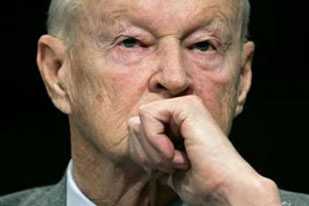| Political Views | |
| By MWC News | |
By David Swanson
 Zbigniew Brzezinski spoke at a RAND Corporation forum on Afghanistan in a Senate caucus room on Thursday. His first statement was that “Withdrawal from Afghanistan in the near future is a No-No.” He offered no reasons why and suggested that his other statements would be more controversial.
Zbigniew Brzezinski spoke at a RAND Corporation forum on Afghanistan in a Senate caucus room on Thursday. His first statement was that “Withdrawal from Afghanistan in the near future is a No-No.” He offered no reasons why and suggested that his other statements would be more controversial.
During a subsequent question-and-answer period, I asked Brzezinski, former National Security Advisor to President Jimmy Carter, why he had provided no rationale for his first rule. I asked him why such a rule should be considered uncontroversial when approximately half of Americans oppose the occupation of Afghanistan. I asked how he would respond to the arguments of a US diplomat who just resigned in protest.
Brzezinski’s response would make Dick “So?” Cheney proud. He responded that it was understandable but that a lot of people are weak and don’t know any better, and they should be ignored. But, he urged that those supporters of war who would criticize the president if he pulled out should be feared and followed.
These are paraphrases. For exact wording get the video. Here are my notes on Brzezinski’s remarks:
- “Withdrawal from Afghanistan in the near future is a No-No.” He gives no reason, just takes it for granted everyone agrees. Says #2 will be more controversial.
- Don’t repeat what Soviet Union did. Don’t Americanize the American occupation of Afghanistan.
- Make sure NATO and anybody else willing is there with the Americans, esply Islamic troops.
The Three Fundamental Noes.
To Do:
- Deny safe haven to al Qaeda. That is THE objective. Don’t build a nation.
- Be sensitive to ethnic diversity while we’re building a nation.
- Do what USSR did in crushing democratic movements in places like Poland. Hire natives to fight.
- We may have to put in more troops. Control cities and roads. Undertake counterinsurgency.
- Pursue accomodations with Taleban and Talebanlike formations.
- Keep economic assistance flowing rather than abandoning Afghanistan as we did after the counterinsurgency against the USSR. Seduce the population.
- Involve the Europeans in funding elimination of narcotic crops.
- Be more respectful of Pakistani strategic interests in Afghanistan.
- Engage China and Iran with their interests in Afghanistan.
- Build a North-South pipeline to the Indian Ocean.
- Rename it The Vietghanipipelinistan Quagmire of Freedom.
OK I made up #11.
Source:









